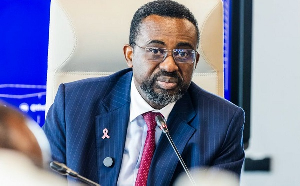US defense official met Kufuor for preliminary consultations on U.S. plans?
STUTTGART, Germany — U.S. plans to develop a new military command headquarters based in Africa are moving ahead, and initial operations should be ready to start this autumn from Germany, the admiral in charge of the project said Thursday.
Although the Africa Command, or AfriCom, headquarters is not expected to be fully operational until September 2008, it is on schedule to begin work on a lesser scale a year earlier and should have a commander to lead it by then, said Rear Admiral Robert Moeller, head of the Africa Command Transition Team.
“We would anticipate the commander of AfriCom will be in place by the time we establish our initial operational capability,” he told a small group of reporters at U.S. European Command’s headquarters in Stuttgart, where his team is working.
Defense Secretary Robert Gates in February announced the plan to establish a full headquarters in Africa, a nod to the continent’s increasing strategic importance.
It is a so-called “unified combatant command” that will be made up of all branches of the military, as well as civilians from the Defense, State, Agriculture, Treasury and Commerce departments, as well as USAID, Moeller said.
AfriCom will initially operate as part of European Command in Stuttgart, then become independent at the end of 2008. It is not yet known when the headquarters will move to Africa, and it is possible that even by September 2008 it will still be based in Germany, Moeller said.
Already, Ryan Henry, deputy undersecretary of defense for policy, has met this week with leaders in six African nations — South Africa, Nigeria, Ethiopia, Kenya, Ghana and Senegal — for preliminary consultations on U.S. plans.
The headquarters would oversee peacekeeping, humanitarian aid missions and military partnership operations with African countries, as well as defense support to nonmilitary operations.
Critics have charged that establishing a headquarters on the continent could provoke anti-American radicals, but Moeller said such considerations are being carefully thought through in determining where the operation would be established and how big it would be.
So far, he said, there has been no decision on either count, although officials in Washington have said they would expect AfriCom to be about the size of other such command headquarters — roughly 1,000 personnel.
“Part of the rationale behind the development of this command is clearly the growing emergence of the strategic importance of Africa from a global ... security and economic standpoint,” he said. “This allows us to work more closely with our African partners to, in working with them, enhance the stability across the continent, broadly speaking.”
The U.S. military has a system under which each region of the world is overseen by a specific command. Africa is now split among European Command — which has the largest area — Central Command and Pacific Command.
The establishment of AfriCom — which is to take responsibility for all of Africa excluding Egypt, which will still fall into Central Command’s sphere — is designed to make it easier to coordinate all of the programs and allow the U.S. to better address regional issues.
Central Command, which has responsibility for the Horn of Africa, set up a task force there in an attempt to catch al-Qaida terrorists escaping from Afghanistan after the war started in late 2001. It since has expanded to humanitarian and other missions.
European Command has sent Special Forces on training exercises in North Africa and done humanitarian projects, medical training and other missions, such as harbor maintenance in oil-producing nations in the Gulf of Guinea.
These efforts are aimed at building partnerships and strengthening the ability of African governments and militaries to do their jobs. The hope is the activities will make nations there less vulnerable to the recruiting efforts of terrorists and help catch those already using them as havens.












